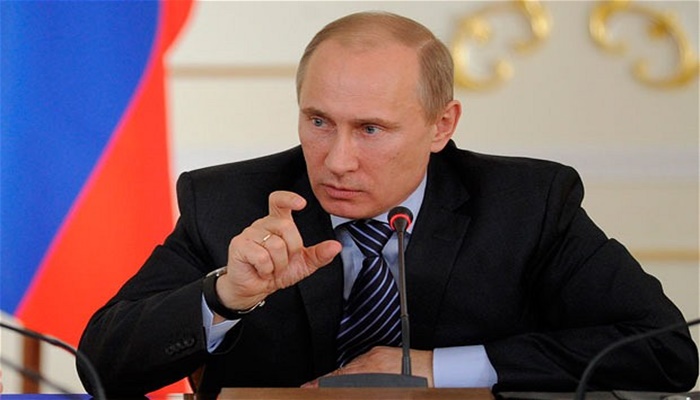
US spy chiefs insisted they have strong evidence that Russia mounted an unprecedented bid to disrupt the American election, standing firm in the face of Donald Trump’s refusal to accept their conclusions.
According to AFP report, one day before the heads of four top intelligence bodies brief the president-elect on their assessment of Russian meddling in last year’s race, Director of National Intelligence James Clapper told a Senate hearing he had “very high” confidence in their findings.
“The Russians have a long history of interfering in elections, theirs and other people’s,” he told the Armed Services Committee. “But we have never encountered such a direct campaign to interfere with the election process as we have seen in this case.”
“This was a multifaceted campaign. So the hacking was only one part of it, and it also entailed classical propaganda, disinformation, fake news.”
Clapper, National Security Agency chief Michael Rogers and Marcel Lettre, undersecretary of defence for intelligence, told the committee in a joint statement that “only Russia’s senior-most officials” could have authorized the operation, in which hackers stole Democratic Party files and emails.
Those files were then disseminated via WikiLeaks, embarrassing the party and harming losing candidate Hillary Clinton’s White House effort.
“Russia has clearly assumed an even more aggressive cyber posture by increasing cyber espionage operations, leaking data stolen from these operations and targeting critical infrastructure systems,” Clapper said.
Trump, who has pledged a rapprochement with President Vladimir Putin’s Russia after taking office on January 20, has repeatedly dismissed that finding.
The Republican has mocked via Twitter past intelligence errors of the CIA, FBI and other agencies, challenging them to prove that the hacking and leaks could be traced up to the top of Putin’s government.
Late Thursday, he again asked “how and why are they so sure about hacking,” claiming that the DNC prevented the FBI from accessing their servers. BuzzFeed News reported that the FBI had in fact never asked to examine them.
As Trump first raised doubts early last month, President Barack Obama ordered the intelligence community to produce a comprehensive report on cyberattacks and Russian interference in the election.
Obama was briefed on the report Thursday, and Clapper, Rogers, Federal Bureau of Investigation director James Comey and Central Intelligence Agency Director John Brennan are expected to detail it to Trump on Friday.
“My hope is that when the president-elect receives his own briefings and is able to examine the intelligence, as his team is put together and they see how professional and effective these agencies are, that some of those current tensions will be reduced,” Obama told Chicago’s NBC affiliate on Thursday.
US officials familiar with the report told CNN that the liaisons who delivered the stolen emails from Russia to WikiLeaks had been identified.
And US intelligence agencies intercepted communications from senior Russian officials indicating they had celebrated Trump’s victory as a win for Moscow, according to a report in The Washington Post.
An unclassified version of the report presented to the president — stripped of sensitive details — will be released to the public early next week.
“I think the public should know as much about this as possible,” Clapper said.
Nevertheless, Thursday’s much-anticipated hearing did not offer any new evidence to back the allegations.
When asked by senators to provide more proof, Clapper repeatedly said he could not do so in public, saying it risked damaging the intelligence community’s sources and operations.
“We have invested billions, and we have put people’s lives at a risk to glean such information,” he said.
Friday’s briefing for Trump will come amid worries he has already soured relations with key parts of the all-important national security establishment.
In addition to casting doubts on their conclusions over Russian interference, Trump raised more hackles on Wednesday by citing WikiLeaks founder Julian Assange to suggest that anyone, even a 14-year-old child, could have been behind the hacking.
Under strong criticism from politicians of both parties for placing more credibility in Assange than the CIA and FBI, Trump defended himself Thursday.
“The media lies to make it look like I am against ‘Intelligence’ when in fact I am a big fan!” Trump said on Twitter.
“The dishonest media likes saying that I am in Agreement with Julian Assange – wrong. I simply state what he states; it is for the people…to make up their own minds as to the truth.”
Without naming Trump, Clapper said there was “a difference between healthy skepticism and disparagement” of the intelligence community.
“And I’ve received many expressions of concern from foreign counterparts about, you know, the disparagement of the US intelligence community,” he said.
“Public trust and confidence in the intelligence community is crucial,” he said.
Asked about Assange’s credibility, Clapper said his publication of leaked materials had “put people at risk.”
“I don’t think those of us in the intelligence committee have a whole lot of respect for him,” Clapper said.






